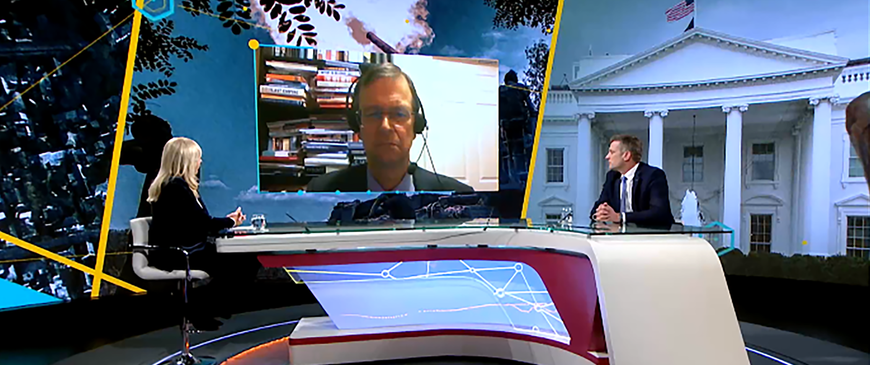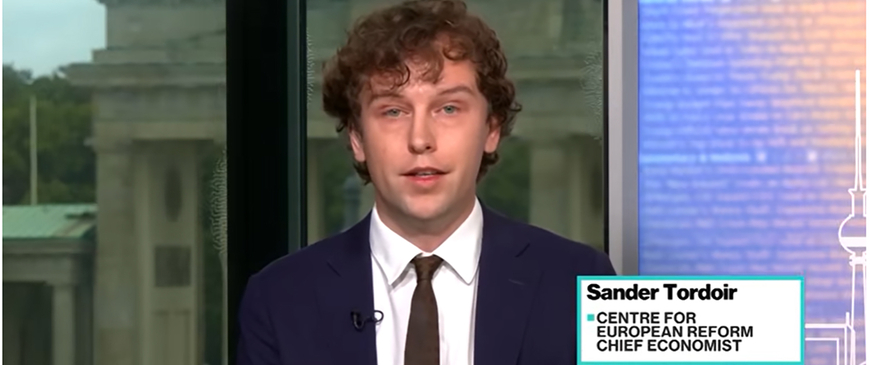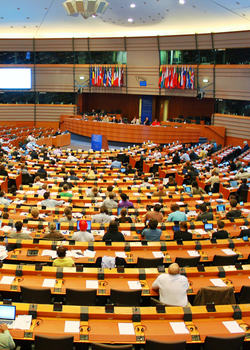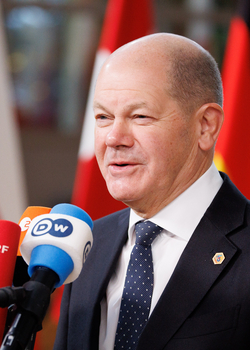Press
European Affairs Committee: UK-EU data adequacy
16 April 2024
Zach Meyers, assistant director, CER gave evidence to the House of Lords' European Affairs committee for its inquiry into UK-EU data adequacy.
Are we heading for World War Three? Experts give their verdicts
16 April 2024
Sky News
"It depends on your definition of World War Three. A possible conflict between Iran and Israel has the potential to expand into a major military conflagration in the Middle East, with global implications.
Laggard EU seeks growth fixes to compete in global shift to new technologies
15 April 2024
Reuters
Zach Meyers, assistant director of think-tank the CER, said the EU's problem was twofold, with growth stubbornly lower than that of its rivals and a lack of dynamism and innovation to adapt."The focus needs to be less on 'saving' existing industries and more on making the EU economy resilient and innovative."
Is Europe at a crossroad?
12 April 2024
EurActiv
“If you think of a world in which geopolitical tensions are going up and in which you have to rearm, being the slow grower is not good news. You are drifting down the economic league table,” Sander Tordoir, a senior economist at the Centre for European Reform (CER) think-tank, told Euractiv.
CER Podcast: Unlocking better regulation in Europe
11 April 2024
Anthony Teasdale and Zach Meyers discuss better regulation.
Rapport: EU:s lagar måste bli bättre för företagen
11 April 2024
Svenskt Naringsliv
En rapport som tagits fram av tankesmedjan Centre for European Reform, CER, visar att EU kan göra mycket mer för att lindra regelbördan för företagen. En central del av kritiken är att EU-kommissionen under ordföranden Ursula von der Leyen har klubbat igenom för många lagar och regler för snabbt och utan tillräcklig genomlysning och förankring.
Comment la France va tenter de défendre sa crédibilité à Bruxelles
10 April 2024
Le Figaro
« Les règles budgétaires sont des garde-fous destinés à préserver la confiance entre les États membres, plutôt qu’à être appliquées au pied de la lettre », explique Sander Tordoir, économiste au Centre for European Reform, à Berlin.
„Finanzcrash in Zeitlupe“ – Ökonomen fürchten das Auslaufen des EU-Wiederaufbaufonds im Jahr 2026
09 April 2024
Table Europe
Sander Tordoir schrieb in einem Papier 2023, dass das EU-Budget mit denneuen Schuldenregeln hätte verbunden werden müssen. Dies würdedie Investitionsbudgets schützen, während es einen Anreiz liefere, dienationalen Budgets in Ordnung zu bringen.
Draghi acude [otra vez] al rescate de Europa con el viejo recetario keynesiano
08 April 2024
El Diario
Sander Tordoir, del Centre for European Reform (CER), think-tank paneuropeísta, pone el dedo en la llaga: la competitividad es una nebulosa de la que siempre hablan los lobistas para presagiar época de vacas flacas, pero, en esta ocasión, en Europa, es un asunto urgente y un baño de realidad, del que “no saldrá con éxito” si no estimula la movilidad laboral, distribuye más equitativamente la riqueza o no canalizan adecuadamente sus cualificaciones laborales.
Euronews: Brussels, my love? Is Europe ready for Trump in the White House?
06 April 2024
We were joined by Ian Bond, deputy director of the CER who warned that Trump was "subservient" to Putin - which is a threat to America's European allies.
Going underground: Behind the growing demand for luxury doomsday bunkers
06 April 2024
Euronews
The best way to avoid a major geopolitical conflict is not to build a bunker but to demand your local representatives fund the Ukrainian war effort, according to Ian Bond, the deputy director of the Centre for European Reform.Bond believes that politicians "will eventually take notice" that there’s more public support behind the war and will do something about it if pressured for long enough and by enough people.
TRT World: As NATO marks its 75th anniversary, is the alliance promoting peace or provoking global conflict?
04 April 2024
As the alliance marks its 75th anniversary, we ask the questions: is NATO a protector of global peace or a potential threat to it? And what does the future hold for the alliance in the next 75 years? Ian Bond, deputy director at the Centre for European Reform (from 07;10 mins)...
Ukrainian Strikes on Russian oil refineries: What's the impact?
03 April 2024
Euronews
"Since Russian import capacity for refined oil products is limited in the short run, since they're set up to export, it's actually a fairly clever way of causing disruption in the Russian market with limited impact globally," Aslak Berg, Research Fellow at the Centre for European Reform, told Euronews.
Eurozone inflation fall defies projections, buoying hopes of ECB interest rate cuts
03 April 2024
EurActiv
"It would be surprising if the ECB cut rates already in April," Sander Tordoir, senior analyst at the Centre for European Reform (CER), told Euractiv.
Una sorpresa en Francia amenaza (de nuevo) la aplicación de las reglas fiscales de la UE
31 March 2024
EL Confidencial
"Dependiendo de cuánto de esto (el déficit) sea estructural, podría de hecho hacer que este ajuste fiscal requerido fuera más alto, tal vez incluso inverosímilmente alto. La Comisión podría entonces tener que suavizar las normas", admite a El Confidencial Sander Tordoir, investigador del Centre for European Reform (CER).
The EU quandary: Labour’s efforts to build good relations and keep red lines
30 March 2024
The Guardian
The economist John Springford, of the Centre for European Reform, whose estimates suggest UK gross domestic product is perhaps 5% smaller than it would otherwise be as a result of Brexit, says Labour’s plans are unlikely to move the dial on growth.
Have low wages permanently ‘scarred’ Europe’s economy?
29 March 2024
EurActiv
Sander Tordoir, a senior economist at the Centre for European Reform (CER), which hosted Wednesday’s event, told Euractiv that the ECB official’s concerns about the negative repercussions of persistently low wages are “exactly right”.
Scotland has lost £100 million a year in salmon exports to EU
28 March 2024
The London Economic
Research out from the Centre for European Reform (CER) in February suggests that Brexit is leaving a hole of almost £100 billion in annual UK exports, making Britain’s economy worse off than if it had remained in the EU.
CER Podcast: Can Berlin and Brussels disentangle their economy from China’s grasp?
27 March 2024
Sander Tordoir and Shahin Vallée discuss China and Germany's relationship.
Kaliningrado: el as en la manga de Rusia en una posible guerra contra la OTAN
27 March 2024
EL Confidencial
"El acceso de Finlandia y Suecia a la OTAN ha mejorado la posición estratégica en la alianza en la región báltica muy considerablemente", dice Ian Bond, vicedirector del Centre for European Reform (CER) y antiguo embajador británico en Letonia. "Antes, la única manera que tenía la OTAN de reforzar a los Estados bálticos era a través del Corredor de Suwalki. Ahora también pueden reforzar el flanco oriental desde Suecia y Finlandia. Y Finlandia, claro, tiene una frontera muy larga con Rusia, lo cual también complica la planificación estratégica de Rusia".















